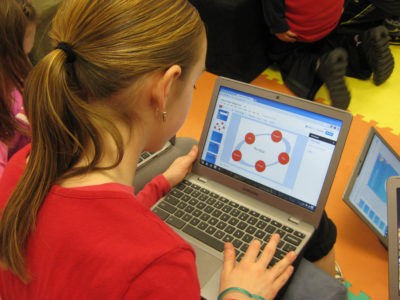
Sal Khan
Most of you are likely familiar with Khan Academy. Khan Academy is an online tutorial program, offering support in Math and other subjects. According to Sal Khan, founder of Khan Academy, he developed the website after determining, through tutoring his family members in math, that educators are limited by time and the educational system to meet the individual needs of the students in their classrooms. At first, he created his online learning platform so his family could access his math tutorials when he was not in town. He eventually expanded the endeavor and opened access to anyone with an internet connection. In his words he wants “a world class education for anyone, anywhere.” Khan Academy is now used in many classrooms as an additional support for students to either access during class or from home.
Since going worldwide, Sal Khan conjectured that because of his success in tutoring through Khan Academy, maybe his ideas would also work in a brick and mortar school. This led to the creation of the Khan Lab School in Mountain View, California. Originally, the Lab School focused on online learning. They soon discovered, however, that the key impact on student learning is the teacher. With this understanding they rethought their program model and brought in teachers to facilitate student learning. Once they shifted the model, they saw positive outcomes for students. This is a very important point to note.
A couple of additional things to know about the Lab School – First, it is a private school with a large price tag to attend. Second, the Lab School serves a highly affluent community, not only because of the high price of tuition, but also because it serves the families in Silicon Valley. This second element calls into question the efficacy of the program. In its current iteration, it fails to serve our most challenging students. It is easy to prove a program works when it is implemented in an area and with students who guarantee success. I, personally, would love for Mr. Khan, to take this idea and implement it in the most challenging school in San Francisco or Oakland to really test the efficacy of the program. It is only in our most challenging environments that we can truly see how an innovative program works.
 With all of my skepticism, there is one particular aspect of the Khan Lab School which I believe would benefit our most underserved students, and with careful planning, could be implemented in our public schools – the Khan Lab grading system. It is unique and non-punitive. What Khan Lab School has done is remove grade levels and the standard letter-grade system, instead focusing on mastery and independence levels.
With all of my skepticism, there is one particular aspect of the Khan Lab School which I believe would benefit our most underserved students, and with careful planning, could be implemented in our public schools – the Khan Lab grading system. It is unique and non-punitive. What Khan Lab School has done is remove grade levels and the standard letter-grade system, instead focusing on mastery and independence levels.
Rather than assign students to a grade-level based on their age, students demonstrate mastery of content. Students are provided a rubric through which they must show ability in both knowledge and skill, according to a specific standard of learning. Students can assess mastery whenever they and their teachers determine they are ready. This means that if a study is at a second grade reading level, but fifth grade math, they are able to study both subjects at their mastery levels. This provides students a flexible timeline through which they may master content at an appropriate rate for their individual needs and teachers are better able to differentiate instruction for each of their students.
A student’s independence level determines how much autonomy s/he has in learning. Independence is also measured on a rubric and assessed when both the student and teacher deem the student is ready. Khan Lab School calls student schedules a “playlist.” Students have certain classes assigned to them based on their mastery, but then there are several spaces left open for students themselves to determine their classes for the week. In their first year at the Lab School there are no open spaces in a student’s “playlists.” As the student moves up independence levels, more spaces open for the student to control her/his trajectory through school. This is extremely empowering, as students are learning to be self-starters, that they have agency, how to advocate for themselves and take control of their learning and their futures.

Group of Friends Smiling
I believe this way of rethinking grades and grade levels would be powerful for all students, especially our most underserved. Imagine implementing a grade system that honors students’ abilities, encourages and teaches independence, and creates a growth mindset in students by developing a focus on their assets, rather than on their deficits. Now imagine a system in which thought leaders, like Sal Khan, endeavored to implement their innovations not in an exclusive school, but in a school accessible to all students, a public school. Students of all backgrounds and abilities would be empowered. Just imagine…
Has your district and/or school been creative with grading students? What are your thoughts on the Khan Lab School mastery and independence levels? Can we make something like this work in our public schools? Why? Share your thoughts and opinions in a comment below. Let’s start the conversation.
Pingback: Blue Sky Thinking | Stories From School
I want to do some blue sky thinking about this. I think I will have to write a post of my own that plays off yours!
Thanks for posting this Mandy. I’ve been interested in this school’s development since it began. One thing I appreciate about Sal Khan is that he has never argued that he can or will replace public schools. Rather, his mission, as I read a few years ago, is to do the research teachers are not able to (thus his expensive private school) and offer up new ideas.
I agree that the idea of removing grades and grade levels is very, very appealing. If public schools worked independently and were not one system inside a larger system, I’d argue we should change immediately. The concerns are in defining what “mastery” really means and finding a common language around this sort of model (which is what the A-F system really is one version of). This, of course, affects high schools mostly. That way colleges and post secondary institutions that rely on our current system to inform them about a graduate would have similar information.
As someone who wen to a more traditional high school and undergraduate school, then attended a graduate program that used written evaluations in the place of grades, I can tell you that no “report card” ever meant as much to me as those evaluations (one page narratives from a professor who had five students total in the program). It was amazing. For it to work in a public school setting, in my opinion, the whole model would have to change in dramatic ways that it is not ready to. I appreciate this information from Khan’s work and think it needs to be part of important conversations and strongly considered in the future of public schools.
Thanks for getting into the conversation. I appreciate your insights. I also attended a school for a short time which used written evaluations and I also loved them. They had so much more meaning than letter grades. I appreciate your comments about Sal Khan, I just wish he did his research within the public schools or, at the very least, with a more challenging student population. That would be real research we could really use in the public schools. I also think you point out something important about high schools being one system inside a larger system. I think that is part of the problem. We always talk about the system and how hard it is to change the system and we fail to focus on what matters which are the human beings who make up the system. Thanks so much for this thoughtful response.
Hi Mandy,
I am curious if you are familiar with Summit Learning? Sounds a lot like what you are describing and available to public schools across the nation…FOR FREE! There are several schools in NE Washington participating right now. Here is a link!
https://www.summitlearning.org/
Thanks for broadening the discussion on this form of personalized learning.
Gretchen
Thanks for this. I’ll take a look.
Mandy,
I’m excited to see you starting a conversation about these ideas. They are, of course, not original to Khan. Followers of the late Ted Sizer and the network he founded, the Coalition of Essential Schools, will be familiar with “demonstration of mastery” as the means for students to progress (no grades). There are many examples of its effectiveness in schools serving students who are not privileged (Central Park East Secondary School (NYC) and Mission Hill (Mass.) are excellent examples. So are the school in the Big Picture Learning network (including my school: Highline Big Picture School). Many of these schools group students in two-year age groups; most students progress from one division to the next after two years, but some need more time, and others need less. These are all public schools, although the non-traditional approach seems to be most successful in school of choice rather than in neighborhood schools trying to be everything to everyone.
The idea that this approach could only work with affluent students would imply that other students could only learn in the presence of extrinsic motivation. In my experience, that’s not the case.
I’d be interested to see the Khan Lab School’s rubric for independence. (I couldn’t find it on the website.)
I went back to see if I got a picture of one of the rubrics, but I couldn’t find one. Thanks for these examples of other schools doing similar work. I’m going to look into them. I think we need to rethink our idea of neighborhood schools. They are trying to be a best fit for everyone, but I think we tend to believe that means traditional-style education, like we’ve seen for over a hundred years. I don’t think it has to mean that. What are you thoughts on that?
I love this idea of students progressing at their own speed and demonstrating mastery which means meeting their needs rather than just seat time. That said, I’m curious what happens when a student masters one topic – does their playlist then involve more of the topics they have not mastered?
I’m not 100% sure. I know they have levels, kind of like Algebra, Geometry, Algebra 2, etc. I think they move up. I’m sure there is review involved. I wish their website was a bit more comprehensive. Thanks for getting involved in the conversation.